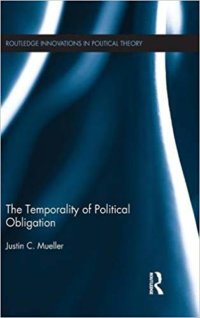The Temporality of Political Obligation

The Temporality of Political Obligation. Justin C. Mueller. New York: Routledge, 2016.
Theorists of political obligation are concerned with the reasons and under what conditions should people obey political authority, a problem that emerges in modernity in the works of Hobbes, Locke, Bentham, Kant, Mill, and subsequent political thinkers. Apologists for political obligation have attempted to describe and the defend the ways in which political obligations can be said to be owed by subjects to legitimate political authority: consent, social contract, fairness, natural duties, group membership, divine commandments, or some combination of these reasons. By contrast philosophical anarchists reject theories of political obligation whether on logical incoherence, normative positions, or empirical evidence.
In spite of their disagreement, Mueller believe that both of these camps are committed to thinking about political obligation spatially rather than temporally and thereby conceal the factor of time in their conception of the citizen and state. In his book, Mueller asks us to think about political obligation in terms of time which allows us to reconceive what constitutes political obligation in a way that moves past the stale debate between apologists and anarchists. Indebted to Henri Bergon and Gilles Deleuze, Mueller conceptualizes time in terms of the lived experience and the experience of time itself (temporality). For these thinkers, time is dynamic and flexible where the past, present, and future simultaneously coexist. With this account of time, the problems and assumptions of political obligation are transformed: the citizen is not an autonomous subject or idealized obligation-bearing member of a community but rather a concrete, complex being that is undergoing change and is pulled in different directions by competing social contexts, relationships and discourses.
What temporality is and how it can used in a political analysis is the subject of the first chapter. The theories of Bergson and Deleuze are reviewed and how their ideas of temporality can help us understand political obligation in ways they did not explore. For Bergson, time and space are constantly being conflated and confused with time being heterogenous in character and space homogenous. To separate these two, Bergson offers the method of intuition to see past the illusions of stability of space for the heterogenous world of time. What we discover is that we lead “double” lives with a conventional self (i.e., a spatial self that is stable and defined by social roles) and a concrete self (i.e., a temporal self that experiences the flow of time in the present). Deleuze also emphasizes difference over sameness, becoming over being, and views time as multiple clusters (past, present, and future) where they are related but ultimately independent of each other. From these two thinkers, Mueller adopts their ideas to think in terms of time and heterogeneity to conceptualize the person and state as one of constant change rather than stability.
In chapter two, Mueller examines the relationship of cultural time and theories of political obligation in the early modern period which favors the new over the past. Cultural time, which gives people meaning and direction in their lives and connect them to something beyond themselves, now resides in the future. The question for the modern person is to reconcile his or her newly-founded freedom with an unmoored future, raising questions like political obligation to be answered. In his examination of Descartes, Rousseau, Deleuze, and others, Muller discusses how the state needs to bind its citizen together through the techniques of vertical and horizontal time-binding.
“Vertical time-binding” is the topic of chapter three: the dialectical process where modern theorists of political obligation look vertically to some authority to bind citizens together. Implicitly used to ground several theories of political obligation (e.g., religious political naturalism, natural duty, membership, fairness), vertical time-binding theories create a universal, homogenous, and atemporal conception of political obligation that perceives reality as a metaphysical hierarchy. The result is stratified images of properly distributed roles, institutions, and behavior for people to adopt. By using Deleuze and Rancière, Mueller shows how these “systems of significance and subjectification” are actually unstable and contingent in spite of their aesthetic allure of permanence.
The counterpart to vertical time-binding is horizontal time-binding which is employed by consent and social contract theorists and philosophical anarchists. Instead creating stratified images for people, horizontal time-binding theorists bind the person across time in a process where the conventional self is used to bind the concrete self across time. Only the stable self, the conventional self as defined by social roles, is perceived by political obligation theorists to be capable of giving consent. But, as Mueller points out, this is unstable since the conventional self is by definition conventional. Consent therefore is not given but imposed by the state to prod the concrete self into submission.
Mueller concludes by introducing two concepts: “chronarchy,” how the many processes of time-binding comprise a public situation that sustain social stratification and structures of rule, and “anachronarchy,” how processes that ossify and order time-binding can be loosen and disrupted. These two concepts create new paths to open up theorizing about political obligation, such as “critical freedom,” which seeks ways to transform society in positive ways while not being subject to the time-binding exercises of the state. This account of freedom allows theorists to push past the obligation/freedom dichotomy to something new and hopefully more affirming.
The Temporality of Political Obligation is not only a significant contribution to the question of political obligation but to political theory itself. By putting time at the forefront of his analysis, Mueller demonstrates how political theorists can rethink and reconceive enduring political questions in new and exciting ways. It paves a new way for political theorists to explore political questions and is a model of what political theory at its best can accomplish.




